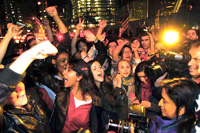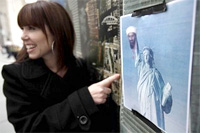Difference between war and a football game
 |
As I begin writing this it's 2 am where I am and 3 am in New York and Washington, where exuberant crowds have gathered at Ground Zero and the White House, chanting "USA! USA!" and singing the national anthem and a country-western song called "God Bless the USA." By the time you read this, you surely will have seen and heard some of that on television. It bodes ill.
The fact that Osama bin Laden was killed well inside Pakistan by US Navy SEALs, is dangerously embarrassing to the Pakistani state and military. "He was right under the noses of the Pakistani military there," said Fox News correspondent Jennifer Griffin, who noted that Abbottabad is a "well-known military town." Lt-Gen Thomas McInerney, also on Fox, was even more ominously to the point: "We've got enough problems with Pakistan that if we had talked to anybody in that government, Osama would have gotten away. We have a problem with Pakistan. Everybody's talking about it. This will highlight it."
Equally worrying is the attitude Americans are expressing toward the US military. It's one thing to be respectful, another to be worshipful, and Americans seem frighteningly oblivious to the cost to our society of its reverence toward the youngsters glibly known here as "our men and women in uniform." Debra Burlingame, sister of the pilot whose plane hit the Pentagon on September 11, 2001, said: "Thanks again to our wonderful military; a big hats-off to the CIA." A US Marine in uniform told the buffoonish Fox correspondent Geraldo Rivera, "I know for the military, we're motivated as hell right now." A Republican former Congressman called the US military "the most important profession that anyone can be in" and said, "I think that this is one for the team."
 |
That phrase calls to mind the in-your-face symbolism of American football as a metaphor for war, and Noam Chomsky's apt description of sports as "training in irrational jingoism." Rivera gushed about the "patriotism worn on their sleeves" of the shockingly young crowd hooting it up outside the White House, but it's more than ever important to reclaim that word from the right wing and to highlight the distinction that George Orwell insisted on way back in 1945: "Nationalism is not to be confused with patriotism. Both words are normally used in so vague a way that any definition is liable to be challenged, but one must draw a distinction between them, since two different and even opposing ideas are involved. By 'patriotism' I mean devotion to a particular place and a particular way of life, which one believes to be the best in the world but has no wish to force on other people. ... Nationalism, on the other hand, is inseparable from the desire for power."
By Orwell's definition, I'm happy to call myself a patriotic American. And such a sentiment is consistent with the Holy Quran, "O mankind! We have created you from a male and a female, and made you into nations and tribes, that you may know one another." Patriotism implies respect for others who are differently patriotic, and that should be fine with everyone. But the young Americans that Geraldo Rivera is celebrating, the children of 9/11, have spent the past decade being trained in irrational jingoism and are blithely unaware of the impression our country has left on the rest of the world. I recall something a thoughtful American friend said to me in Haiti in 2004, a year when that country was more than usually brutalised by American power, "When you see other people waving their countries' flags you think, 'That's nice, they love their country.' When you see the American flag, you know people are going to die."
"Too many people still believe in the state, and war is the health of the state," wrote Ernest Hemingway in 1934. Sixty-four years after its founding, and for explicable reasons, Pakistan is still in state-building mode, and the military is an effective and patriotic national institution. I visited Swat in March, and since then I've been praising what I perceive as its restraint and benevolence there to audiences around the US. But the fact that bin Laden was killed, by US forces, just down the road from a Pakistani military school in Abbottabad is a severe black eye to the Pakistani state. Pakistani citizens and media will be doing their country a patriotic service if, far from excusing it, they continue to hold the state's feet to the fire for what clearly was either its incompetence or its complicity with bin Laden. Such assertion of Pakistani society's independence from the Pakistani state will count for a lot in coming days and weeks as friends of Pakistan like myself, and others of goodwill, do our best to resist another surge of militaristic American nationalism.
As I watch over and over the mobs in New York and Washington, I fear two things. One is that too many Pakistanis are too traumatised to lay aside their anger and frustration. "WE HATE AMERICANS!!!" a Pakistani I don't know personally told me on Facebook, just as I was finishing this piece. When I pointed out that I'm American and asked if he hated me, he replied, "I hate all of u!!"
The other thing I fear is that too few Americans appreciate the difference between global war and a giant football game. Football players have no more individuality than cogs in a machine, and the role of the crowd in a football stadium is to channel the emotions of vindictive triumphalism and hatred. That's what I'm seeing on US television as I write this. The legendary populist politician Huey Long is reputed to have said, prophetically, "When fascism comes to America, it will come wrapped in the American flag." Or, as CNN quoted someone as asking pithily if pathetically on Twitter, "If Osama bin Laden is dead, can we please have our rights back?"
The writer is the author of "Alive and Well in Pakistan" and "Overtaken By Events: A Pakistan Road Trip".
Topics: Opinion, Osama Bin Laden, Pakistan, United States Of America, White House
Views: 3485
Related Suggestions

















